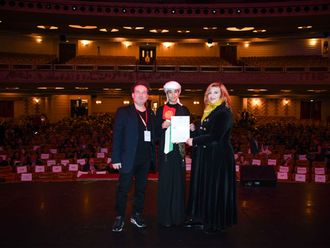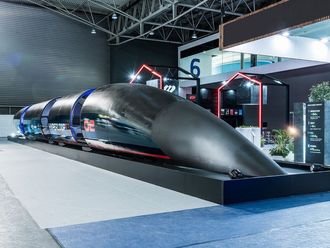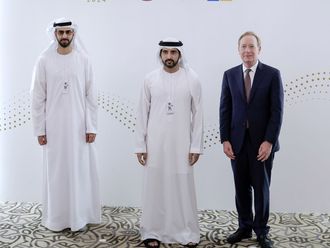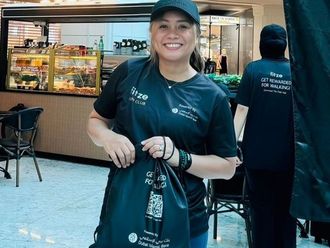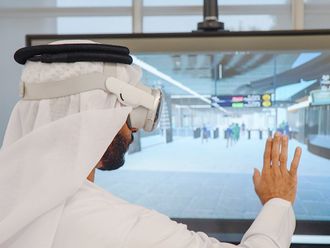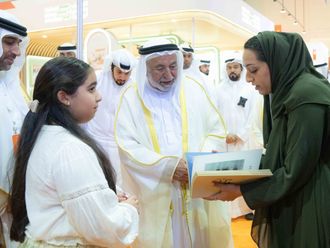Philippines President Gloria Macapagal-Arroyo yesterday expressed confidence that normalcy would return to strife-torn areas in the country, backing the military's capability to effectively neutralise the extremist Abu Sayyaf in the south.
The Abu Sayyaf, a relatively small band of rebels which is fighting for the establishment of a secular Islamic state in the south, has been largely blamed for the recent breakdown of peace and order in Basilan and Sulu islands and the consequent weakening of the economy in general. The President said her government is intent on crushing the Abu Sayyaf and similar lawless groups which could pave the way for the continued development of the country.
In a radio programme hosted by her husband Jose Miguel Arroyo, the president said she wants "to see peace and order fully restored in the country, the problem of the Abu Sayyaf finished and the economy propped up and brought back to normalcy".
"What is important is that we continue our fight for peace in the country," she said. Arroyo last week ordered an intensified crackdown against the rebel group in Basilan and Sulu, which resulted in the arrest of dozens of identified members and supporters.
The intensified crackdown aims to cut civilian support to the rebels in the two southern islands as the military continues its hunt for more than 15 hostages by the Abu Sayyaf in Basilan. Among the hostages are two Americans, Martin and Gracie Burnham. A third American hostage, Guillermo Sobero, is believed to have been beheaded.
According to the military, there are at least a thousand suspected Abu Sayyaf members but only 200 to 300 of them are actually armed. Human rights groups have criticised the crackdown and accused the military of violating the rights of the people by arresting them without the benefit of a warrant issued by the court.
Some rights workers have condemned the crackdown as a "Gestapo style" offensive open to abuses by the military. But Rigoberto Tiglao, Arroyo's spokesman noted that the campaign has been viewed as effective and successful. Tiglao noted that Abu Sayyaf spokesman Abu Sabaya has not been able to make any public announcements or call radio broadcast stations which he uses for propaganda because his former supporters refuse to give him batteries for his satellite phone.
According to Tiglao, 30 suspects who were earlier apprehended have already been released due to weak evidence but one of those arrested was Anwar Abdul Hammid, a local Abu Sayyaf leader who carries a P1 million ($18,867) reward for his capture.
Tiglao said charges of kidnap for ransom would be filed against the remaining 41 – 27 of them from Basilan and 14 from Sulu – who were mostly supporters of the Abu Sayyaf who either provided the bandit group with food, firearms and ammunitions, and even sanctuary for them or their hostages. They are now detained in the army headquarters in Basilan and Jolo.
Tiglao also clarified that no human rights violation complaints have actually been filed against the military or the police as alleged by some non-governmental organisations who are also providing legal assistance and counselling to some of the alleged rebel sympathisers. "Justice Secretary Hernando Perez's orders specify that the military should be very careful about the arrests," he said. Our Zamboanga Correspondent Al Jacinto adds: The government's crackdown against the Abu Sayyaf in Basilan and Sulu is continuing and the number of people arrested is growing, security officials said yesterday.
Maj. Alberto Gepilano, spokesman of the government's Task Force Comet, which is charged with pursuing the terrorists, said the campaign is gaining popular support from civilians in the two provinces. "Criminal charges will be filed on Monday against those who are arrested," said Gepilano. "It is the civilians who are providing the authorities with information about the Abu Sayyaf," he said.
Arroyo confident normalcy will return
Philippines President Gloria Macapagal-Arroyo yesterday expressed confidence that normalcy would return to strife-torn areas in the country, backing the military's capability to effectively neutralise the extremist Abu Sayyaf in the south.




